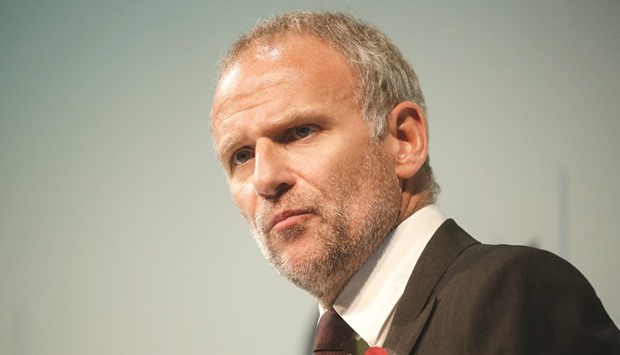Britain’s new Prime Minister Theresa May has made bridging the gulf in pay between the top and the bottom rungs of the corporate ladder a plank of her fledgling premiership. That’s cast an unwelcome spotlight on UK retailers, where the discrepancy is particularly glaring.
Tesco chief executive officer Dave Lewis earned £4.63mn ($6.1mn) last year — meaning that less than two years into the job his compensation was 321 times higher than for the grocer’s average worker, according to corporate governance researcher Manifest.
The disparity is personified by Kemal Foster, one of Tesco’s 300,000 UK employees, who’s made a living for four years by stacking shelves in an east London superstore. With an income that may not be enough to keep him above the poverty line, Foster feels aggrieved about the pay gap between those running Britain’s biggest companies and lower-rank workers. “Why should we get that much less?” said the 32-year-old father of two, referring to executive pay levels at Britain’s biggest 100 companies that advocacy group The High Pay Centre estimates are 180 times what the average worker makes. “It’s not fair at all. We make the money for the ones at the top.”
A Tesco representative said the company offers store staff one of the highest pay and benefits packages in UK retailing.
The likes of Foster are getting the attention of May, who plans to make companies publish the ratio of their CEO’s pay to that of their average worker. That will add to pressure on retailers, many of which are struggling to mitigate the cost of meeting the minimum wage, which was increased by about 10% this year. According to PricewaterhouseCoopers, Britons think it’s appropriate for a large-company CEO to earn just 20 times the average.
Retailers have more to think about than most other companies because 57% of their workers make the minimum wage — £7.20 per hour for those aged 25 and over — or only slightly higher. That’s more than double the national average of low-paid workers in other industries.
“Retail businesses have been underrating the value of their staff and overrating the significance of the people in the boardroom,” said Richard Hyman, an independent retail analyst. “They’ve been able to grow without investing much in their employees.”
Two other retailers — Next and Sports Direct International — are among UK companies with the largest discrepancy in pay between their CEO and an average worker.
Some have already made a start in tackling the disparity between pay at the high and low ends of the scale. Ikea and Lidl pay staff the so-called living wage — a voluntary benchmark set above the minimum wage — of £8.25 an hour.
“Those companies show paying higher wages to store staff can be done and most retailers can definitely show more restraint at the top,” said Stefan Stern, director of The High Pay Centre. “The incentive is to start moving now rather than waiting to be told.”
May called out an “unhealthy” and “irrational” disparity in corporate pay this month as part of a speech outlining her intention to tackle injustices in class and gender. Even before her intervention, multi-million-pound pay deals across British industries have come under scrutiny from shareholders. In April, almost 60% of BP investors voted against a $19.6mn pay package for CEO Bob Dudley.
For retailers, the issue of executive pay resonates beyond grumbles of investors. Tesco and the likes of Marks & Spencer Group and Next represent the public face of British business and their sensitivity to alienating customers was apparent in the buildup to the European Union referendum, when the majority of retailers declined to take a public position on the vote.
“Engineering or pharmaceutical companies are a bit esoteric, but everyone goes shopping,” said Hyman.

Tesco chief executive officer Dave Lewis earned u00a34.63mn ($6.1mn) last year u2014 meaning that less than two years into the job his compensation was 321 times higher than for the grocer’s average worker, according to corporate governance researcher Manifest.
